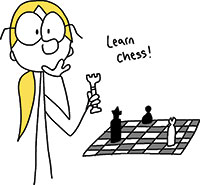
Entertainment
“What can I do anyways?”
35 screen-alternative ideas
*****
You can’t beat something with nothing (as Eph. 4:28, Matt. 12:30, and Matt. 12:43-45 make clear).
That means if you want to do RP's 10-day screen-fast challenge July 21-30, it isn’t realistic to expect to manage without your phone if you haven’t made plans for what you’ll do the next time you’re tempted to reach for it. So here are ideas for what you and your family can do with your screen-free moments, minutes, hours, and days.
Plan away
- Short-term - Using the list below and a brainstorming session with family or friends, create a list of activities for your 10 days of screen-free time.
- Medium-term - pull out a big piece of craft paper and along with your family create a list of items you’d love to do this summer.
- Long-term - Spend an hour writing out a list of 50 goals, big or small, for your future. Share and refine it with input from family and friends.

On the homefront
- Clean one room at a time – you have 10 days, so what if you took on one room a day, and gave it the “clean, organize, and de-clutter” you’ve been meaning to do just about forever?
- Honey-do list - make your better half happy by fixing something.
Hospitality
- Host a dinner for friends and do it up with candles. Make meal prep part of the entertainment by learning to make something new. Sushi anyone? How about calzones?
 Put on a games night, and invite your friends to bring along their favorites. Invite someone you might not normally interact with. Focus on games that allow for conversation (the less intense sort). Search for “board games” on ReformedPerspective.ca for our suggestions.
Put on a games night, and invite your friends to bring along their favorites. Invite someone you might not normally interact with. Focus on games that allow for conversation (the less intense sort). Search for “board games” on ReformedPerspective.ca for our suggestions.
Reconnect
- Is your family spread across the continent, or around the world? Pick up the phone and chat away – phone one person a day.
- Everyone loves a letter – make a package to mail away to grandma and grandpa.
Read something awesome
 While your local library likely has too much weird stuff to want to take your kids there, you can reserve books to pick up. Before you turn off your computer to start your screen fast, be sure to check out RP’s recommendations for picture books, graphic novels, biographies, and novels for all ages. We have hundreds of nominees for you at Reformedperspective.ca/books. Remember to take a book with you wherever you go to fill in those spare moments when you used to play a phone game.
While your local library likely has too much weird stuff to want to take your kids there, you can reserve books to pick up. Before you turn off your computer to start your screen fast, be sure to check out RP’s recommendations for picture books, graphic novels, biographies, and novels for all ages. We have hundreds of nominees for you at Reformedperspective.ca/books. Remember to take a book with you wherever you go to fill in those spare moments when you used to play a phone game.- New Testament Bible reading challenge anyone? If you read for a half hour each day, starting at Matthew, you could make it through most of the gospels in 10 days.
- Listen to a dramatized audiobook like the Chronicles of Narnia.
Interview someone
- Interview your grandparents or parents or an inspirational someone you’d like to learn from… but first, alone, or together with friends
 or family, come up with a list of 20 questions to ask them. How did they meet their spouse? Was there an important lesson they learned the hard way? How have they seen God acting in their life? If they could go back in time, what would they tell their 15-year-old self? Etc.
or family, come up with a list of 20 questions to ask them. How did they meet their spouse? Was there an important lesson they learned the hard way? How have they seen God acting in their life? If they could go back in time, what would they tell their 15-year-old self? Etc. - Interview your cat, dog, or even your favorite book, and imagine the answers they’d give. Be sure to write it all down, so you can share it with your family!
Start (or share) a hobby
- Always wanted to learn to crochet, draw, or play the guitar? Get yourself prepped to give it a real go by either finding someone who will teach you, or finding a book or maybe even a video series (maybe that’s one of your exceptions?).
- Teach your kids, or a friend’s kids, how to sew, whittle, sketch, paint, or hit a baseball.

Get some exercise
- Go for a long walk each day or head out on a hike with your spouse, family, a friend or two, or take the time alone to talk with God.
- Try something new. Pickleball anyone? Rock climbing? How about swimming? Or what about a program to help with your achy knees?
Volunteer
- Babysit for a couple so they can have a nice evening out.
- Ask your oma if she needs any help around her house or yard.

- Deliver some Let Kids Be brochures door-to-door for ARPA Canada.
Staycation
- Become a tourist in your own backyard and check out your local attractions – museums, zoo, historical sites, hiking and biking trails, playgrounds, thrift stores, and more.
- Build a fire in your backyard, roast marshmallows, make s’mores, stargaze, and swap tall tales.
Reboot your gratitude
- Start a gratitude journal and journal daily – God has given us so much that we can easily overlook the blessings all around. Give Him glory by taking the time to see it all.
- Make it a family challenge to come up with 5 (or more, or less – see how hard or easy it is) events, people, or things that made you happy today. Write each one down on a notecard, accompanied by some related artwork, and post them to a hallway wall. For motivation’s sake, come up with a small reward (a Hershey kiss?) for each notecard, and a small penalty (one push-up per) for whatever each participants falls short of.
Click away
- Create a photo scavenger hunt for your friends – a list of 10 items for teams to search out and find in the great outdoors and take a picture of to prove they found them. Items can be anything, but they should be possible, but hard, to find like a four-leaf clover, or something in nature shaped like a Z, etc.
- Take pictures for RP's summer photo contest. Find the rules and deadline by clicking here.
An evening inside
- Read the same book together, out loud with one copy (taking turns, and maybe while doing a puzzle) or quietly with multiple copies. Be interruptible so you and your kids can share your favorite parts.

- Create your own game together. It can be whatever you like, but two easy and fun possibilities involve variants on Pictionary and charades. The first step is to create a “deck” of 100 things you’ll either draw or act out with every player contributing ideas. You can now divide into teams, or just take turns being the drawer or actor, with everyone else guessing. Mix it up by giving the option of acting or drawing the card. Play a round and get everyone to offer up a new twist on the rules and then vote on your favorite and play again.
Write
- Write about your experiences doing the screen-fast and think about sharing it with RP!
- Write a letter to your younger self and share the 10 pieces of advice you’d want him to know.
Falling asleep
- Fall asleep to a devotional. If you find it hard to get to sleep at night without a screen, try reading a devotional. Prayer, and then a few minutes reading, can help you hand off your concerns to God. If you’re married, take turns doing the reading.
- Couples can use the undistracted time at the end of the day to be fully present with their spouse – emotionally, spiritually, and physically. Turn off the screens and turn toward each other.
Challenges
 Everyone loves a competition so create a challenge a day and recruit your family and friends. Examples could include doing 100 of anything (push-ups, squats, etc.) over a day. Or going 24 hours without saying anything negative (do a pushup/squat when you blow it). Track how many times you reach for or pine for your screen using a communal tick – maybe a sheet of paper on the fridge. See how you compare to your friends, and how your first day compares to day 10. Challenge your kids to find 10, 20, or even 100 things in their room (or the house) to throw out or give away.
Everyone loves a competition so create a challenge a day and recruit your family and friends. Examples could include doing 100 of anything (push-ups, squats, etc.) over a day. Or going 24 hours without saying anything negative (do a pushup/squat when you blow it). Track how many times you reach for or pine for your screen using a communal tick – maybe a sheet of paper on the fridge. See how you compare to your friends, and how your first day compares to day 10. Challenge your kids to find 10, 20, or even 100 things in their room (or the house) to throw out or give away.- Plan out the next challenge that Reformed Perspective should do.
Pictures by Hannah Penninga.













